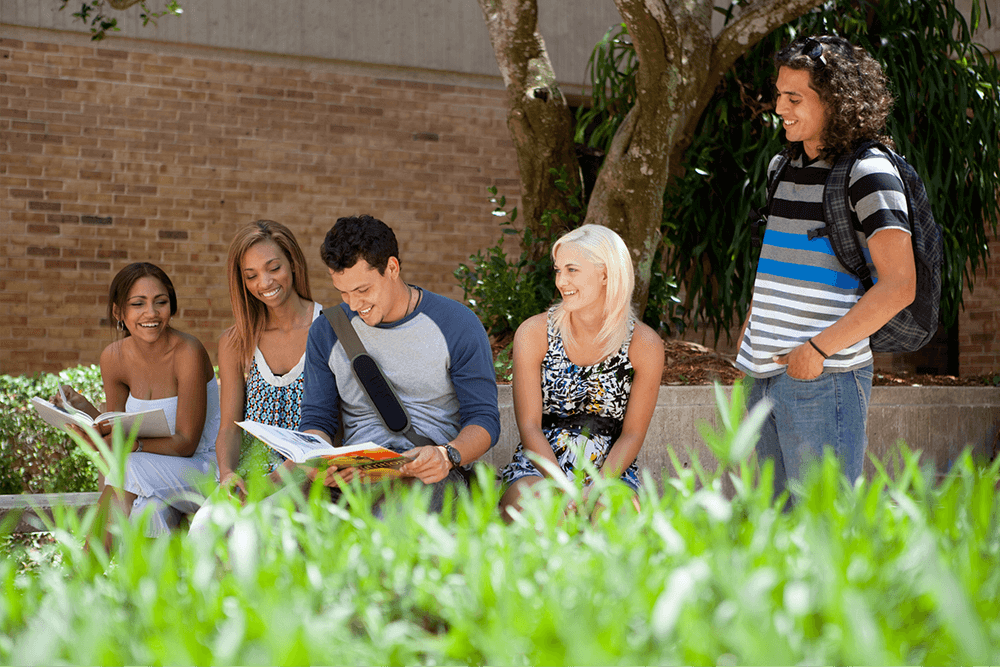Community-based / Service Learning
What is Community-based / Service Learning?
Community-based / service learning is academic learning completed in partnership with community members or organizations. It includes any type of learning that centers community partnerships within the learning such as service learning, academic field trips, and academically-focused domestic travel. While much of this learning is organized through individual faculty and faculty academic departments, service learning is centralized through Engaged Learning.
Service Learning creates abundant opportunities for Valencia students, faculty, and staff to learn in partnership with the community and develop competencies that relate to course content and promote the advancement of socially responsible citizenry. Service Learning is a teaching and learning strategy that opens an opportunity for students and faculty to blend educational goals alongside their own interest in community organizations and discipline-related experiences. For more information on what Service Learning looks like at Valencia College, watch this video below.
Community-based / service learning capitalizes on experiences centered in the community to create deeper connections to both academic learning and the community. It is unique in that it authentically frames learning within the world in which the student inhabits, deepening its relevance and connection to prior/future learning. Each experience includes exposure to a community entity as well as knowledge and reflection that connects the experience to the learning.
Service Learning experiences are specifically designed to benefit students and the community through a reciprocal relationship in which the community partner benefits from the service and students gain college credits while building knowledge.
Students
Why get involved in Community-based / Service Learning as a student?
General community-based / service learning experiences can be found in many courses, some of which designate this involvement through registration information in the text beneath a course section. Service Learning experiences are specifically designed to benefit you and the community through a reciprocal relationship in which a community partner benefits from your volunteer service and you earn college credits while building knowledge in four key areas:
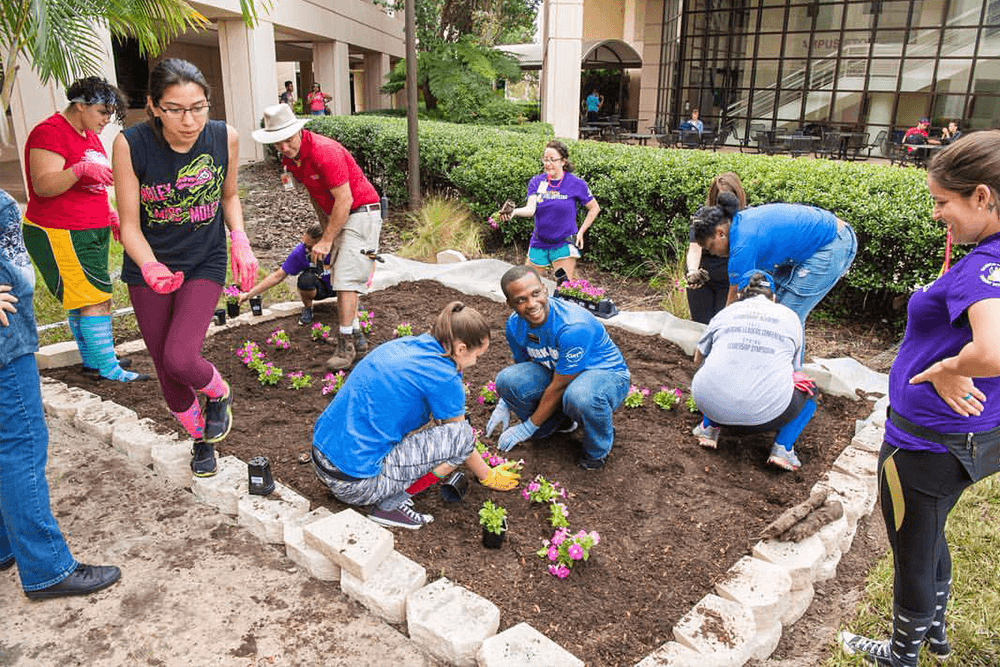
Academics: Exercise your higher order thinking skills through analysis and understanding of complex problems while connecting your classroom learning to experiences in the community.
Career: Connect your service to professional exploration and analyze your skill set growth related to potential careers. You’ll have the opportunity to explore potential career options, gain practical workplace-like experience, and make professional contacts.
Civic Engagement: Research the community organization and those it serves while exploring your role as an active member of your community. You will also get the opportunity to work with people from different cultures and backgrounds, which can further strengthen skills such as cultural awareness, personal mindset, and empathy.
Personal: Experience personal growth through challenges and will develop new skills and increase your own self-confidence through your time engaging in service learning.
For additional information on how organizations have been advancing civic and community engagement in higher education, please visit Campus Compact.
Community-based / service learning in higher education has also been shown to positively impact the likelihood that you will continue with your education each semester and all the way through to graduation (AAC&U, 2023).
Watch these videos to hear about experiences from other students:
Students
How you can get involved as a student
There are three ways that Engaged Learning can support your involvement in community-based / service learning: independent service learning courses, integrated service learning courses, and service learning study abroad courses. Each type of course provides opportunities to engage with authentic community needs while building up your resume experience and the skills mentioned above. In addition, when you accrue a minimum of 40 service learning hours on your transcript, you are awarded a distinction that is showcased as a medallion that you add to your graduation regalia.
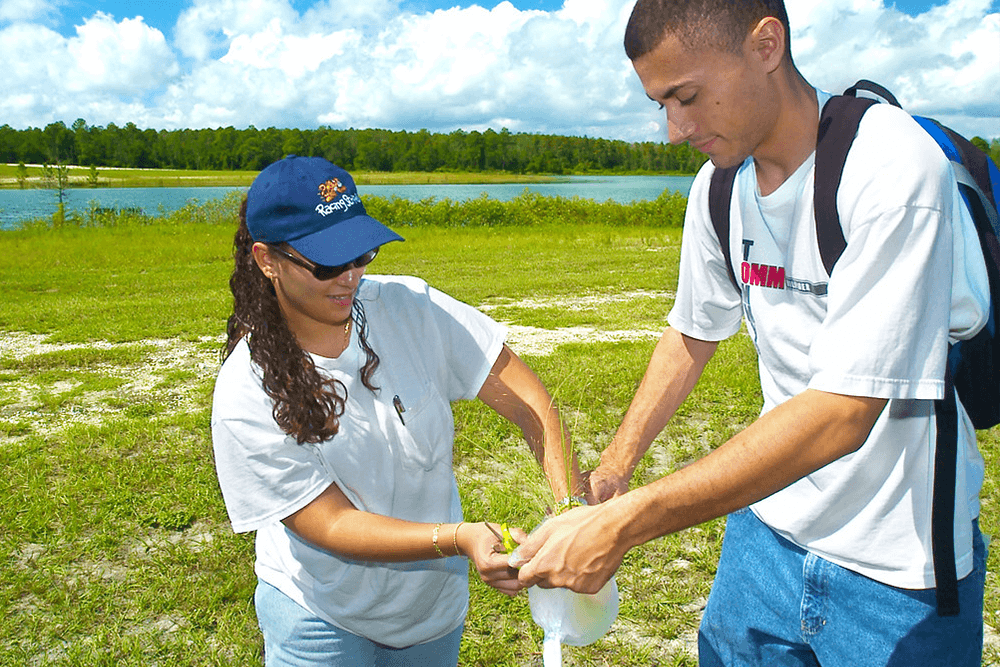
-
Independent Service Learning Courses
In the SLS 2940 Service Learning or SLS 2940 Service Learning Honors courses, you get to take 1-4 credit hour service learning courses and complete 20+ service hours for each course credit hour. You’ll get to regularly meet with your faculty mentor and complete assignments designed to help you derive meaning from your service experiences, learn about the community, and represent your significant learning to others. You can choose any non-profit organization with which to complete your service provided they review our Partnership Statement prior to you starting your service hours. To get an idea of some of the possible community partners with which you could complete your service, please visit this Featured Community Partners guide. Here is also a list of community partners that have worked with Valencia College service learning students in past semesters. Please reach out to engagedlearning@valenciacollege.edu with any questions.
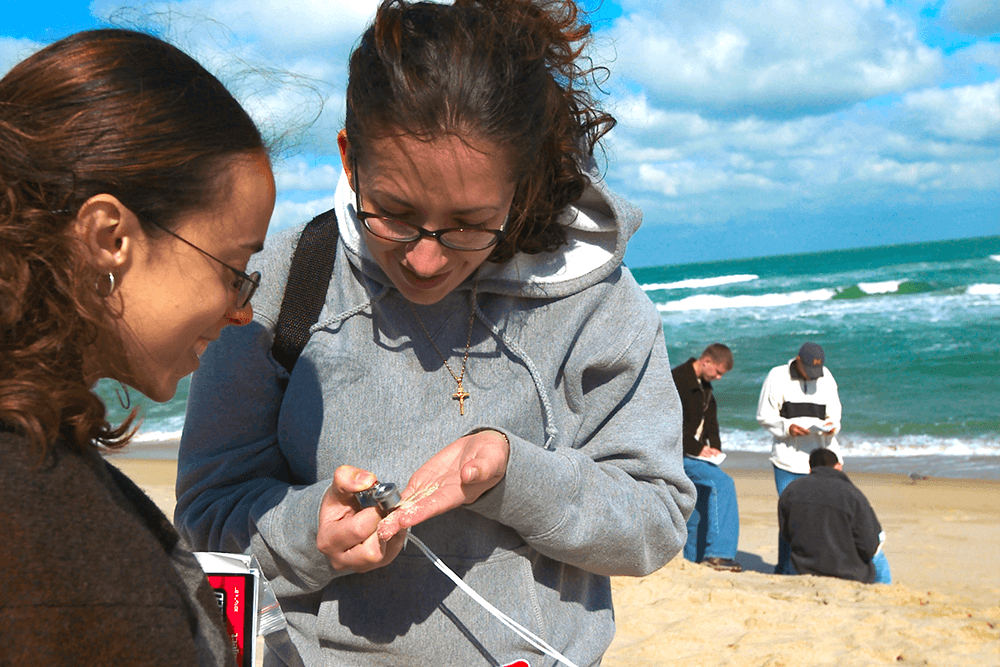 Independent Service Learning Course
Independent Service Learning CourseTo register for an independent Service Learning course, complete these two steps:
- Watch this video to get an overview: Independent Service Learning Overview Video
- Complete this short Application form.
After that, a member of the Engaged Learning team will be in touch to discuss the next steps with you. Please note that it is preferred that applications for Fall term courses are completed by July 21, Spring term courses by December 1, and Summer term courses by April 1.
-
Integrated Service Learning
In this type of Service Learning, you get to complete a portion of your course by engaging in community-based service and related assignments. You will earn service hours on your transcripts without having to pay for additional college credits. In addition to being a good resume building and networking experience, these service hours accrue towards the graduation recognition listed below. To search which courses offer integrated Service Learning, please visit the Credit Class Schedule Search and check the box for Service Learning in the “Class Type” section.
-
International Service Learning
Short-term study abroad programs that incorporate service learning provide a unique academic and cultural experience that can expand your worldview and influence your career goals. International service learning courses not only have the same benefits as traditional Service Learning (see above), but provide a unique opportunity to build cultural competence as you visit another part of the world. For more information on current offerings, please visit SAGE Short Term Programs.
Service Learning Recognition
As a student, you have the opportunity to earn recognition by completing a service project in an integrated Service Learning course, an independent Service Learning course (SLS2940 or SLS2940H), and/or a service learning study abroad course:
-
Transcript Recognition: Your transcript will reflect the number of service hours connected to the course CRN(s) and you have the option to receive recognition for up to 15 additional service hours per independent service learning course. This is a great way to show your civic-minded learning and leadership to colleges that you transfer to and prospective employers.
-
Graduation Distinction: If you complete a minimum of 40 service hours in service-learning coded courses, you will be awarded a medallion to wear at your graduation. Medallion colors signify the number of service hours completed:
- Bronze (40-55 service hours)
- Silver (60-75 service hours)
- Gold (80-95 service hours)
- Chrome (100 or more service hours)
Faculty
Why get involved in Community-based / Service Learning as a faculty member?
There are many teaching strategies that you can use to support students in their learning. However, experiential education such as community-based / service learning capitalizes on the existing connection between students and their community to situate learning in a relatable context and bring to life your discipline-specific material in a lasting way. When done with fidelity to experiential learning pedagogical models, community-based / service learning can create a framework that forms the foundation for students to become life-long learners. One of the foundational theories that grounds this work is Experiential Learning Theory (Kolb, 1984), and the fidelity of the model has been further appreciated with the newer field of study in brain-based learning.
There are many benefits to community-based teaching, and in particular, courses that incorporate service learning have significant benefits for you and your students. For you, it can:
- invigorate your curricula by bringing it to life in new ways
- motivate students by demonstrating the connection between classroom learning and their community
- foster your skills as a reflective practitioner as you learn along with your students
- create civic engagement that connects you, your students, and the College more deeply to the community, social issues, and authentic applications of your discipline
- support the articulation of student growth related to civic, pre-professional, personal, and academic learning
- increase student course enrollment, attracting interest from students seeking to earn transcript and graduation recognition for service hours
- increase student retention in your and subsequent courses
- enliven general education outcomes such as Cultural and Historical Understanding; Quantitative and Scientific Reasoning; Communication Skills; Ethical Responsibility; Information Literacy; and Critical and Creative Thinking.
For additional information regarding service learning, please visit our Service Learning LibGuide.
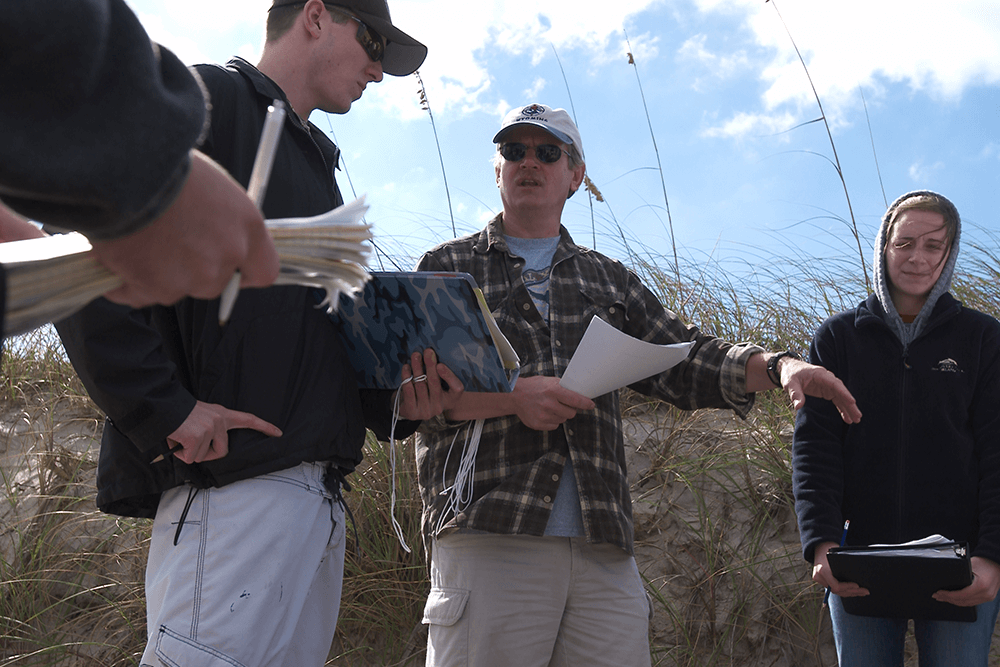
For more information on pedagogy connected to experiential learning, please email engagedlearning@valenciacollege.edu and consider completing the workshops associated with the Society for Experiential Education’s Experiential Education Academy.
How you can get involved as a faculty member
There are many ways to integrate the community into your classroom through experiential education such as building learning around field trips or community-based undergraduate research. A member of the Engaged Learning team would be glad to talk more about ideas for authentic community involvement in your classroom.
For example, organizations such as Riipen and Forage can help create relationships between faculty and industry partners to offer work-based learning experiences for your students to engage in.
With Service Learning in particular, there are three ways for you to get involved that earn students transcript and graduation recognition: independent courses, integrated courses, and international study abroad courses.
-
Independent Service Learning Courses
In the SLS 2940 Service Learning or SLS 2940 Service Learning Honors courses (SLS 2940/H), students apply to take 1-4 credit hour service learning courses and complete 20+ service hours for each course credit hour. As a Faculty Mentor for this course, you’ll have access to the SLS 2940/H course template, and get to meet regularly with your student(s) in support of their community partnerships and outcomes attainment for academic, personal, pre-professional, and civic learning. Provided that the non-profit community partner reviews our Partnership Statement, you and your students can choose any non-profit organization as a service learning partner. To get an idea of some of the possible community partners that have asked to be featured partners for students, please visit this Featured Community Partners for Independent Service guide. Here is also a list of community partners that have worked with Valencia College service learning students before. Please reach out to engagedlearning@valenciacollege.edu with any questions.
To become credentialed to teach SLS2940/H, the first step is to complete the LCTS 7220 Introduction to Service Learning course (3PD). After that, a member of the Engaged Learning team will complete the credentialing process and send mentorship offers based on student application indications of discipline, campus, and preferred mentors. Please note that, similar to teaching an internship course, teaching the SLS 2940/H course will not count towards your course workload.
-
Integrated Service Learning
Embedding Service Learning into your course(s) can be a very effective and impactful way for your students to meet one or more of your course outcomes. Service learning outcomes inherently include academic, personal, civic, and career goals that can be developed by meeting a community need. For example, students enrolled in a web design class might design a website for a non-profit community partner; students enrolled in a humanities class may collect stories from people in a nursing home and create art representative of those stories; and students enrolled in an SLS 1122 New Student Experience course may be given the option to choose any community partner, provided they review our Partnership Statement, to complete service and related reflections. You get to choose the number of service hours and they are added to the course along with section text prior to student registration. To get an idea of some of the possible community partners that have asked to be featured partners for service projects that can accommodate a full class, please visit this Featured Community Partners for Integrated Service guide. The Featured Community Partners for Independent Service guide may also be a helpful resource should you decide to provide options for your students to select and complete service on their own. Here is also a list of community partners that have worked with Valencia College service learning students before. Please reach out to engagedlearning@valenciacollege.edu if you have any questions.
If you are interested in integrating a course with service hours, you will want to complete the LCTS3213 Service Learning Across the Curriculum (20PD) faculty development course, through which you will explore strategies for integrating your course with service learning and create an implementable lesson plan. Once you have successfully completed the course and are ready to integrate service learning, you and your dean will send the completed Integrated Course Approval Form along with your lesson plan to engagedlearning@valenciacollege.edu.
In order to ensure that courses can be advertised and coded with service learning hours prior to student registration, the deadlines for integrated course approval forms are:
- Fall and Summer: Feb 10
- Spring: Oct 10
-
International Service Learning
Short-term study abroad programs that incorporate service learning provide a unique academic and cultural experience that can expand students’ worldview and influence their career goals. International service learning courses not only have the same benefits as traditional Service Learning (see above), but provide a unique opportunity for students to build 21st century skills such as cultural competence as you take students to another part of the world. If you are a full-time faculty member, you can complete the SAGE Program Leader Certificate through Faculty Development and apply to lead a short-term study abroad. For more information, please contact the SAGE Office.
Community Partners
Thank you for exploring information about Valencia College’s academically-based community partnerships. Valencia’s vision is to be a premier learning college that transforms lives, strengthens communities, and inspires individuals to achieve excellence. As a community partner, you are a key collaborator in learning that yields benefits to your non-profit organization through academically-incentivized volunteer service and provides career-related, academic, and personal growth experiences for students.
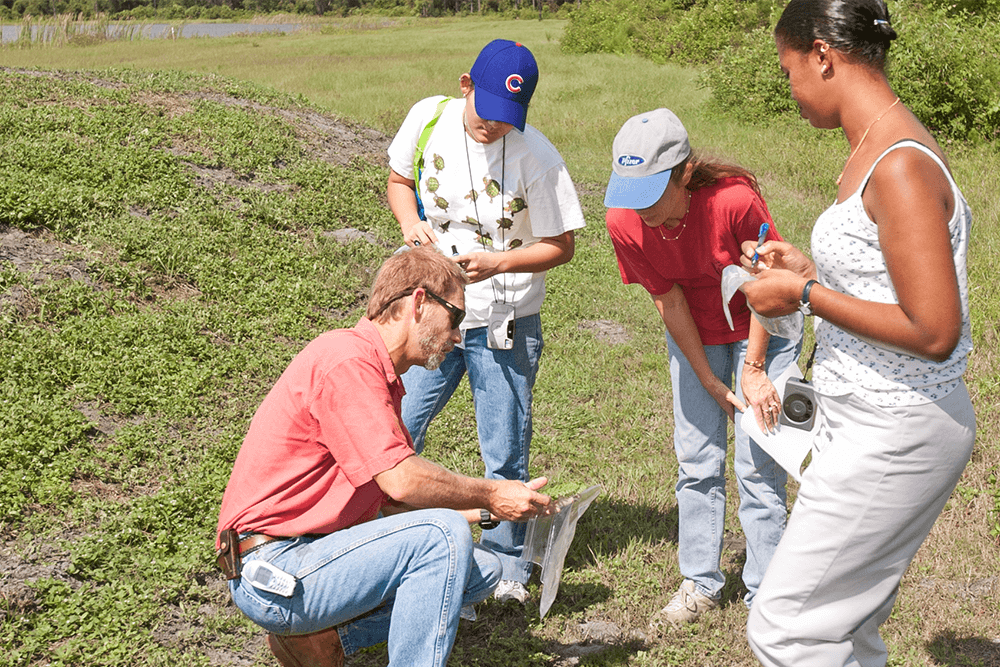
Why partner with Valencia College through Community-based / Service Learning?
Engaged Learning recognizes the importance of learning that occurs in the context of the community and workplaces, and strives to support you, students, and faculty by providing supporting infrastructures to facilitate these impactful connections. These benefits can be realized through in-person or virtual service that can be completed through interacting directly with the beneficiaries of your organization’s service or indirectly through organizational support that ultimately impacts the beneficiaries. As a community partner, your non-profit organization will enjoy multiple benefits from academic Service Learning such as:
- direct and/or indirect support for the beneficiaries of your organization’s service
- access to the discipline-specific knowledge and general skills of today’s college students and faculty to problem-solve for your organization and community needs in a variety of subject areas
- support from individual and/or 20+ student class groups
- participation in the learning, growth, and mentorship of student citizens
- increase awareness and create future advocates for your organization and social issue
- contribute to the education and preparation of future community leaders, non-profit employees, and public servants
- inspire a culture of volunteerism that extends beyond the classroom
- foster positive exposure and change within your community
Ready to Get Started?
If you have questions or are interested in exploring more about a service learning partnership with Valencia, please email engagedlearning@valenciacollege.edu. If you’re ready to begin a service learning partnership, please review the Partnership Statement below. There is also a recommended, but not required, marketing opportunity to become a Featured Community Partner for Valencia students and faculty below.
The Partnership Statement is a document that outlines community partner and college responsibilities and expectations. We approach partnerships with community organizations as reciprocal and mutually beneficial. The goal of our partnerships is not only for our students to learn by serving as volunteers, but also for the work of students to contribute in valuable ways to the work of our partner organizations. Once the form is reviewed, students may begin service hours with you.
Does your non-profit organization want to be a featured service learning community partner for our students and faculty? Please complete the Featured Community Partner form to share information about your organization and opportunities.
